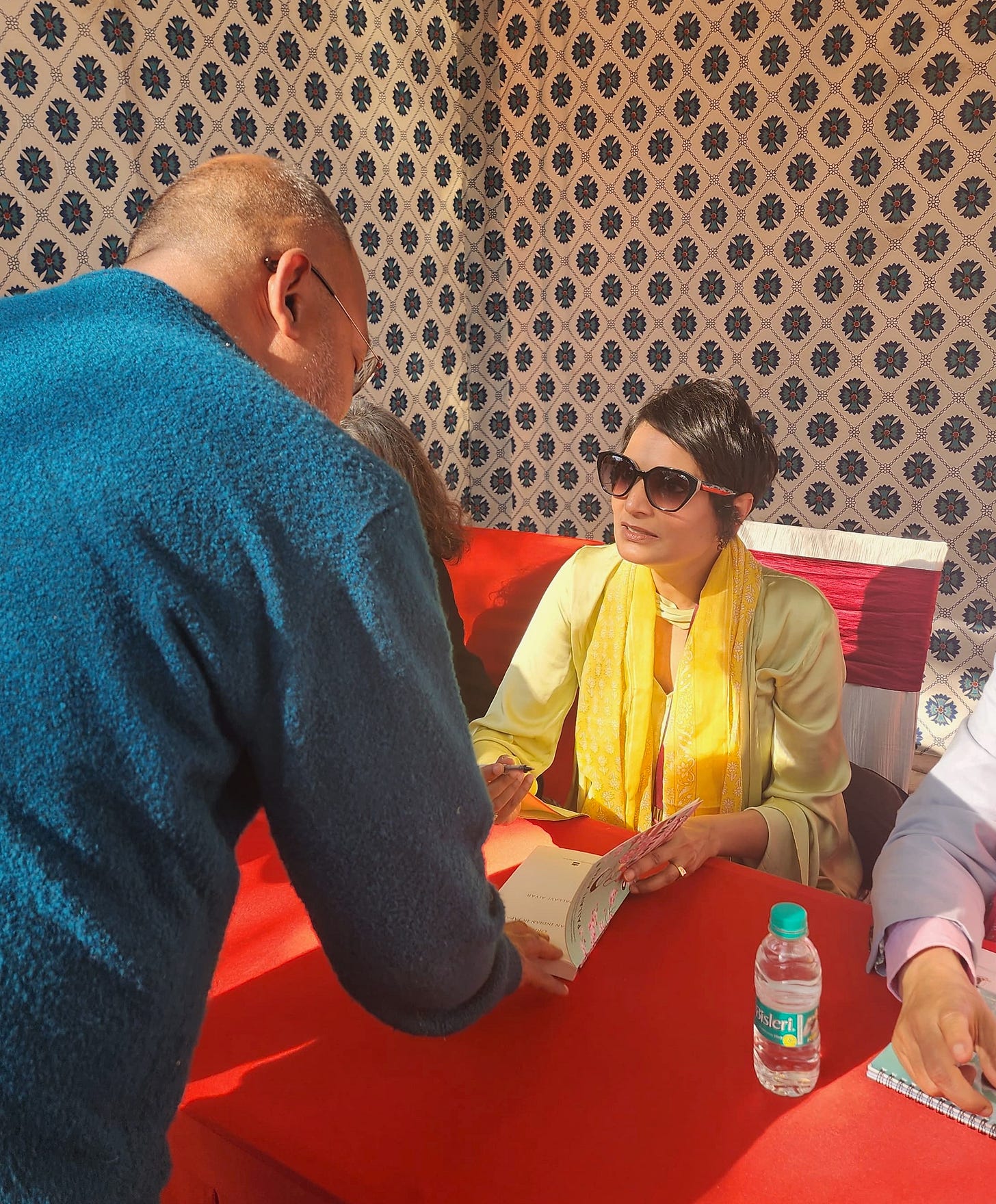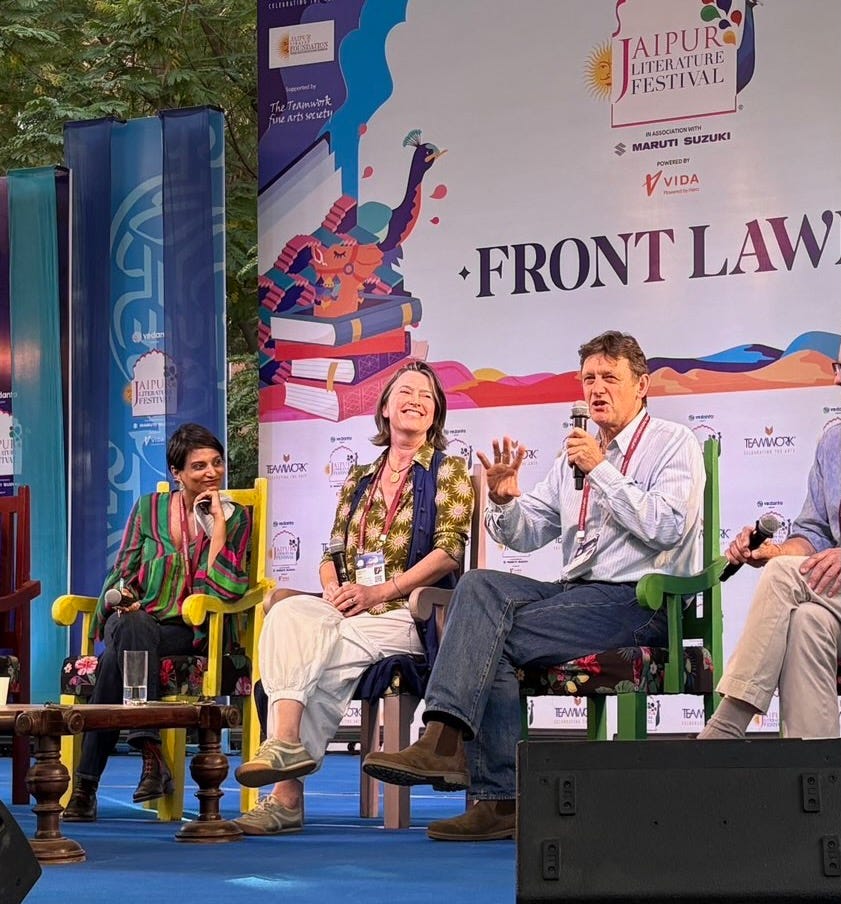Dear Global Jigsaw,
I am just back in Madrid after a week in India to speak at the Jaipur literature festival, a gathering of the literati in numbers that only somewhere as demographically fecund as India can amass. It is billed as the largest such festival in the world, with half a million people in attendance. And is the kind of place where you end up sharing cars with Nobel prize winners. The amalgam of royal palaces that serve as backdrop, glittering parties and intellectual fodder is heady stuff, which is why I agreed to go. Despite the physical resistance – tensing of muscles, catch in the throat- that even the idea of passing through Delhi, enroute to Jaipur, provoked unbidden.
Delhi has always been home. For someone as peripatetic as me, it has represented the solid in an otherwise ephemeral life. It has tethered me amidst the moves between countries and cultures. It was my permanent address, even though I haven’t lived there in a quarter of a century. It was at the core of the palimpsest of my personal biography, the stable center upon which narratives from China, Japan, Spain, Belgium and Indonesia have been superimposed.
But now I dread the moment when I land at the airport. There is a yawning pit that opens in the stomach, and I am sucked into a vortex of associations that feel unbearable. Because, I realize, it was never Delhi, but my mother. It was my mother who tethered me. It was she who was my permanent address. And then she died. And I am left floating, buffeted by winds of grief that gather gale force in the city of my birth.
I read Joan Didion’s, The Year of Magical Thinking, on the plane. It is her account of the science-defying geography of grief. A place she enters when her husband of over four decades drops dead in the dining room, in the moment her attention is on the mixing of the salad. His last sentence before he died was something about asking her what scotch she had used in the drink she had just poured him.
The last sentence my mother said to me, ten hours before I got the call saying she was gone, “Let’s talk tomorrow.” How does someone just “go”? How can they be alive and then dead? One imagines that crossing heralded by some kind of cosmic cry. But it’s only a blearily answered phone call and in that instance, you are evicted from home. A friend who lost her mother described it as the roof over her head being blown off. For me it was a hacking at my roots. Untethered. Metaphors are all that’s left to make sense of the vertiginous unreality when someone goes, poof! Were I to poke my finger into the air around me, it would stretch like latex. The ground flips into the sky. Grief is like Alice in Wonderland drinking a magic potion. As Didion put it, it’s a world of “magical thinking.”
It is also Didion who gives name to what Delhi does to me- the vortex effect. In Grief, all roads do not lead to Rome, but to memories. You look at the airport and think it looks smarter than you remember. You are excited by that new restaurant, and oh don’t those croissants look delicious! My mother loved croissants. Vortex. You try again. Maybe you should pick up some sweets for a friend you will be meeting in Jaipur at the Duty Free? You browse the aisles. Three minutes pass without thinking of the thing you don’t want to think about. And then, it swims into vision. Your mother holding out boxes of kaju ki barfi for your boys. How they gobbled up this bit of India. How delighted she was. How you didn’t appreciate her enough.
Delhi’s potential for triggering this vortex effect is immense. I cannot be in the city and avoid it. And so, I run. There was a time when I accepted invites to events in India with the primary purpose of stopping over in the city of my birth. Now I take a direct flight on to Jaipur. Once there, I am free of the vortex for a while. I breakfast with a paleontologist and drink coffee with a Kashmiri poet. I listen to a panel on Palestine and another on ageing. I talk about my last book, Orienting, during a session about Japan. Later, I sign books and am gratified to meet with “fans.” This is not a regular occurrence. I laugh and think and eat, vortexless.
On day two, I am chairing a panel of British travel writers. We meet in the authors’ lounge an hour before our session to go over the plan of action. I enact chairwomanship – taking charge, bantering, getting the panel warmed up. And then I do not know how, I am in the vortex and when I come to, I am babbling about how my mother was there and then gone and it felt like being run over by a truck. The men on the panel are off to one side of the table, and my audience consists of two women. They are English. I should be performing a stiff upper lip, I think, but here I am on the verge of tears.
I’m so sorry, I say, repeatedly. This is too much information. I don’t know what came over me.
The writers are very kind. The older one tells me that she wrote the book she will be talking about, Black Earth City: A Year in the Heart of Russia, because her own mother died when she was sixteen. The mother had been Russian and so the writer had decided to travel to Russia to find her. Grief is all magical thinking.
The younger woman says her mother is unwell and likely to die soon. We sit there in the winter sun, this sorority of the bereft, thinking of mothers.
Travel can be a misleading term. It is not only about going from one place to another, but an inescapable part of being human. To be alive is to move; stasis is impossible. The Greek philosopher, Heraclitus, summed this up as panta rhei - everything flows. “No man ever steps into the same river twice, for it is not the same river and he is not the same man.” We are not the same at eight as at eighteen or eighty. Our lives are a collage of formative journeys through schools and marriages, hospitals and haircuts. And grief.
Our travel panel is a success.
xxxxx
Thank you for reading. Until next week
Pallavi






I had to hold back a tear or two. Grief hits so randomly.
I stopped going to Bombay after my parents died. The city no longer meant anything to me.
Then it hit me. It was hardly ever the city in the first place. It had been my parents all along.